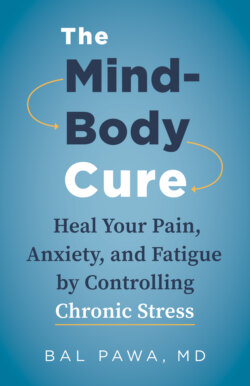Читать книгу The Mind-Body Cure - Bal Pawa - Страница 41
На сайте Литреса книга снята с продажи.
➤ Indirect Effects of Chronic Stress on the Brain
ОглавлениеIndirectly, stress hormones cause changes in the gut (our second brain) as well as in many other systems in the body. The gut damage from stress is especially relevant to the brain for several reasons. It impacts the production of serotonin, since our gut manufactures between 80 and 85 percent of our body’s serotonin. Gut damage causes local inflammation that eventually finds its way to the brain and other organs. And stress appears to interfere with the way the bacteria in our gut communicate with our brain. Stress hormones also cause lack of sleep, wearing down the normal capacity of the brain to detoxify and repair itself from daily use. Overall, chronic stress exposes the brain to more inflammation.
Another indirect effect of stress on the brain is the poor diet choices made by people under stress. Stressed individuals tend to eat poorly or snack on junk food, drink more alcohol, or even abuse drugs (both prescription and recreational), which exposes the brain to more toxins. Stressed people tend to become sedentary. Lack of regular exercise is also detrimental to the brain, since the increased blood flow during exercise is good for circulation and oxygenation.
Chronic stress also changes electrical brain waves, which we can measure with an electroencephalogram (EEG) machine. When excessive cortisol disrupts the electrical wave patterns, it changes the neurochemicals in the brain, which causes arousal or alertness. Chronic stress can disrupt our sleep-wake cycles and change our normal circadian rhythms. Sleep deprivation is common in people with unresolved stress. Chronic sleep deprivation is a health risk for heart disease and diabetes and negatively affects brain memory and concentration, leading scientists to correlate it with dementia.
Remember, however, that our mind has dominance over the brain and can regulate the ANS to a great degree. To achieve health, we must learn to pump the brakes and turn off the constant flow of gas. We can cultivate a healthy brain by being aware of our beliefs and internal thoughts. By learning to challenge automatic thoughts, we can consciously replace them with intentional ones, which creates new neural thought patterns. New thought patterns lead to different behavioral choices, which first become traits and eventually turn into habits. When these thought patterns include a health mindset and positive beliefs, they are the foundation for long-term physical and emotional health.
